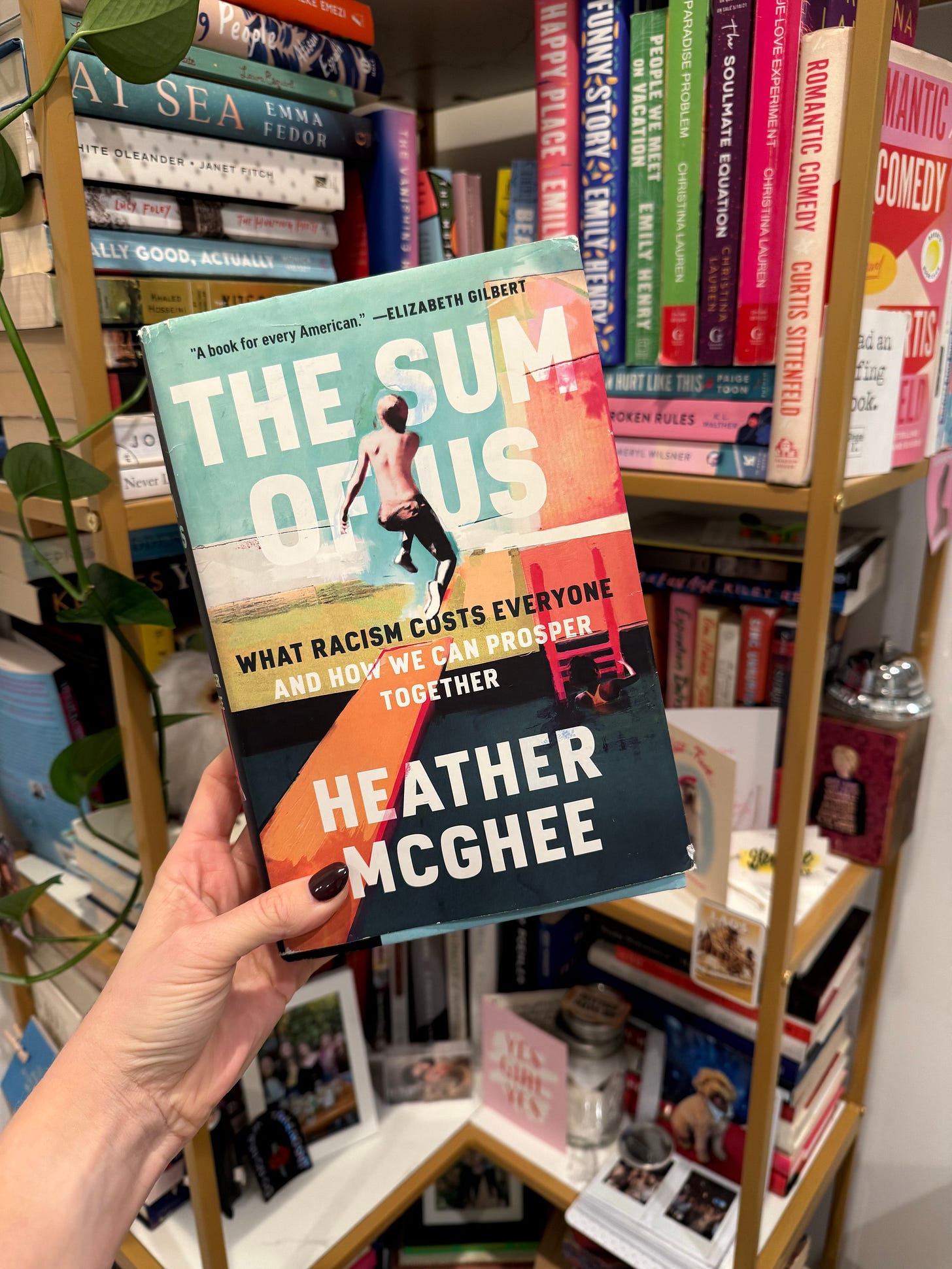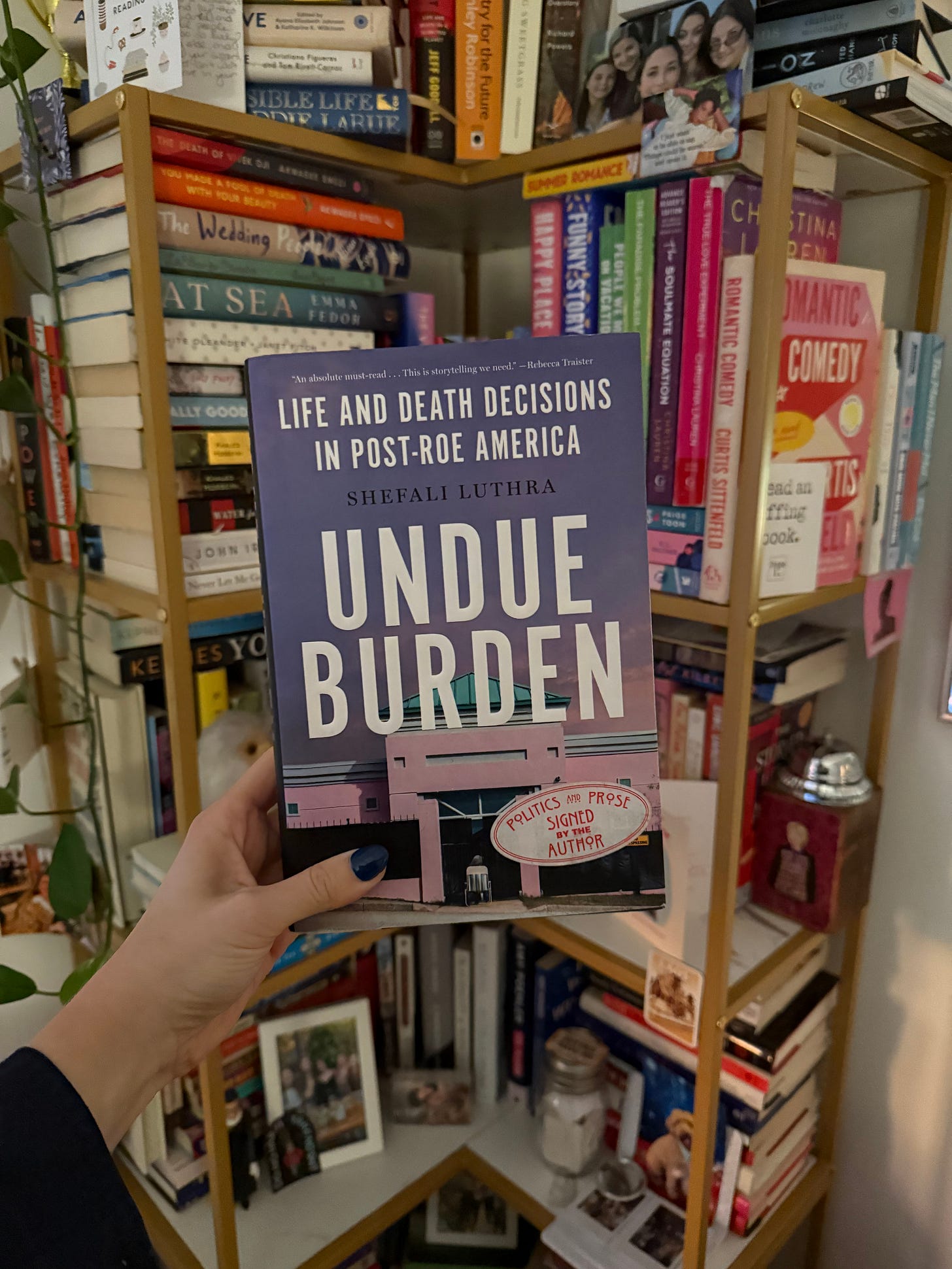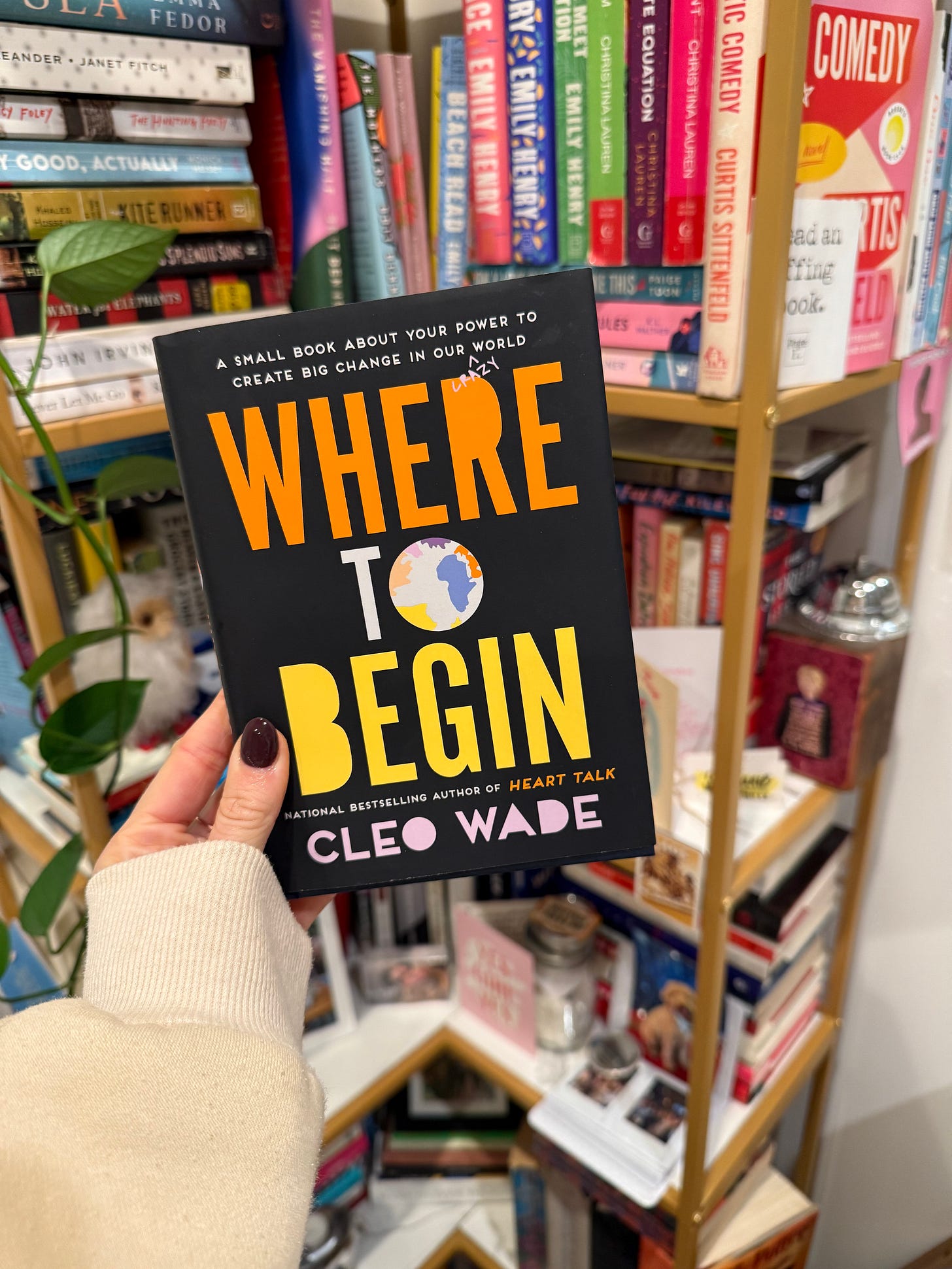The post-election resource guide
The non-exhaustive stop for books on race, gender, democracy, and hope
Hi friends, I am so overwhelmed by the outpouring of support I received from so many of you in response to my election week reflection. I felt nervous pressing “publish” - not for any lack of conviction, but because it still feels as though there aren’t strong enough words to capture the depths of the anger, sadness, fear, and anxiety that this election outcome has stirred up. Speaking candidly, I know that this time around is more dangerous and more threatening than what we lived through from 2016-2020, and that makes the next four years feel impossible to endure. But I also know that the incoming administration is counting on us to feel disheartened, disillusioned, and disengaged, and that’s what we will not deliver to them.
“I refuse to sit around being angry and anxious all the time. I am not going to be a dead woman walking. I am staying hopeful and energized. Why? Because I can. How? I choose to be. Let’s turn the chaos of the day into actions that will strengthen our democracy, empower the powerless, and build healthier communities today and a more sustainable tomorrow.” - Gina McCarthy, Public Service for Public Health, an essay from the anthology All We Can Save
As promised last week, this newsletter is designed more as a searchable resource guide of books that have helped develop my own understanding and engagement of key issues and injustices in the United States and around the world. I found each of these books not only to be incredibly informative, but also beautifully written and compelling. This list is certainly not exhaustive, and I would love to add to this guide over time with your recommendations. My hope is that these books can serve as accessible (and enjoyable!) resources to you and your loved ones and provide some semblance of agency and autonomy as we fight back against the hateful rhetoric and actions of this next administration. It’s going to take all of us in the years ahead.
History and the Real Cost of Racism in the U.S.
CASTE: THE ORIGINS OF OUR DISCONTENTS by Isabel Wilkerson. I read this book at the end of 2020, and it is moving to the top of my list to reread in early 2025. Isabel Wilkerson is one of the most beautiful, thoughtful, and intelligent writers of our time, and I feel this book should be required reading for all Americans. Wilkerson explores the idea that a hierarchical caste system is at work in the United States, more powerful than race, gender, or class alone. She carefully and methodically reports on the U.S. origin story, the rise of Nazi Germany, and the inner workings of the India caste system, and she deploys clever analogies, personal anecdotes, and current events to deliver a highly digestible and compelling read. Bonus: after you finish reading this, you can watch the film adaptation by Ava DuVernay, which was brilliantly executed in telling Wilkerson’s own personal story and bringing her research vibrantly to life.
THE SUM OF US: WHAT RACISM COSTS EVERYONE AND HOW WE CAN PROPSER TOGETHER by Heather McGhee. This is another book that is moving to the very top of my re-read list in 2025. I spent most of 2021 yapping about this book, and it is still one that I pull from in everyday conversations. The Sum of Us explores key issues - from access to quality education and safe, affordable housing to union membership and workers’ rights to stronger environmental regulations and public health protections - through the lens of how entrenched racism has inhibited progress and hurt all of us, including white Americans. McGhee is an incredible writer: each and every topic felt so tangible and digestible as she builds the argument that the lie of American history and politics is that there is a zero-sum game, and more rights for some means less rights for others. This is a bold-faced lie that is deployed to protect the power of a very small elite at the top, and middle-class, white Americans are often voting against their own self-interest because of this lie (sound familiar?). Given what we just witnessed in this election, The Sum of Us feels urgently important, and I have often thought of this book as the practicum that builds upon the foundation set by Caste by Isabel Wilkerson.
Governance & the Economy
MISSION ECONOMY: A MOONSHOT GUIDE TO CHANGING CAPITALISM by Mariana Mazzucato. This book, written by award-winning economist and advisor to international leaders, Mariana Mazzucato, is a brilliant, riveting, and pragmatic assessment of the need to re-evaluate economies around the world, assessing those economies’ public-private partnerships, investments, capacity and overarching structure. This book went to press during the pandemic, and Mazzucato’s preface offered a razor sharp analysis of the ways in which weakened government capabilities - in the name of efficiency! - and an overreliance on outsourcing contracts - also in the name of efficiency! - have resulted in an inability to respond to crises. This book astutely answers the question, “What kind of world do we want to live in, and what does the economy and the government need to look like to create that world?” I don’t consider myself well-versed in economics by any stretch of the imagination, and I found myself so deeply appreciative to Mazzucato for laying out such a clear and concise forward-looking vision and effective counter-argument against those who propose a smaller government and weaker social safety net is the way to live.
Gender & Reproductive Justice
UNDUE BURDEN: LIFE AND DEATH DECISIONS IN POST-ROE AMERICA by Shefali Luthra. I finished this book just one week before the election, and it is equal parts devastating, chilling, anger-inducing, and heartbreaking. Shefali Luthra documents the history and politics of the anti-abortion movement, culminating in the Supreme Court’s decision in 2022 in Dobbs v Jackson Women’s Health Organization that overturned Roe v Wade - a case that was decided in 1973 and protected abortion as a constitutional right. In the two years since Dobbs, we have seen the haunting and irreversible repercussions of “turning abortion back to the states”: women die. The maternal and infant mortality rate has increased, significantly, in the states where abortion is banned or extremely limited, disproportionately for Black women and women of color, and that should be the warning sign, but somehow it has not been. Luthra weaves in the personal stories of those impacted since the Dobbs decision, covering states that have implemented abortion bans, as well as the states who have actually expanded access to abortion but cannot keep up with the new demand of serving the healthcare needs of out-of-state women. The thesis of the book can best be summarized by this excerpt from the afterword: “The story of abortion access is and always has been a story of health care, something that other nations have deemed a basic human right but that in much of the United States is still treated as something available only to those with enough money… The bans and barriers they faced in accessing care have given them the same message: the country they live in does not trust them to make their own decisions about their lives. They are less of a person than someone who could not get pregnant. Many of them believe that America does not care if they live or die. After hearing their stories, I cannot blame them.”
INVISIBLE WOMEN: DATA BIAS IN A WORLD DESIGNED FOR MEN by Caroline Criado Perez. It has admittedly been five years since I first read Invisible Women, and therefore one that I have already decided will make it to the reread list in 2025. Caroline Criado Perez takes a topic that is seemingly dense and one I am much less familiar with - the gender data gap - and sounds the alarm for why we are so lacking in data and information about one half of the world’s population. In our public policy and business decisions alike, men are treated as the default, and it’s up to the women to play catch-up, with implications ranging from annoying to life-threatening. Why, for example, do we not have clear data on the efficacy of pain medication for women? Why do women suffer through undiagnosed heart attacks because their symptoms are considered ‘atypical’? Why are the dummies used in car safety tests based on the male body? These are choices that are perpetuated daily, and as Perez eloquently lays out, the dangers of these choices are multiplying in the context of the rise of artificial intelligence. This follows reason after all: AI can only make sense and make predictions based on the data available, and the data for women is either not collected or not disaggregated. This is a powerful read and a clear explanation for how pervasive the male bias and prominence runs through our society.
GOOD AND MAD: THE REVOLUTIONARY POWER OF WOMEN’S ANGER by Rebecca Traister. I have been thinking about this book a lot since last Wednesday morning. Published in 2018, in the wake of the #MeToo movement, Rebecca Traister catalogues the role of female anger as a political catalyst, looking at key moments in history from the suffragette movement to the 2016 election. I have thought about this book in the quiet moments of my own life, particularly in professional settings, where it is so glaringly obvious how the responses to anger differ based on if it comes from women or men. I could never begin to count how many times I have heard women apologize for feeling angry, for reasons that are in fact so deserving and worthy of anger. My hope is that we can recognize anger as often an indicator of grave injustices in the world and channel it towards an unparalleled force for change.
Climate & Environmental Justice
THE FUTURE WE CHOOSE by Christiana Figueres and Tom Rivett-Carnac. Talk about a pragmatic, hope-filled book from the experts who led negotiations for the United Nations in 2015, resulting in the historic Paris Agreement. What I love perhaps most of all about this book is how it’s structured: first, by outlining the two worlds we must decide between and encouraging us to be thoughtful in determining the future we choose; second, by describing three mindsets that will help us chart a path forward (spoiler alert: stubborn optimism, endless abundance, and radical regeneration); and third, by detailing the ten actions we must collectively take to address the climate and biodiversity crises. Taken together, I think this makes for a great read that is accessible to those who have long been part of the environmental movement and those who are looking to learn more and get involved. On my hardest days at work, this is one of the books that I return to: it reminds me of the urgency of the fight we are up against and the millions who have dedicated their lives to pushing for ambitious climate action.
ALL WE CAN SAVE edited by Ayana Elizabeth Johnson and Katharine K. Wilkinson. There is perhaps no book more dog-eared and underlined on my entire bookshelf than this stunning collection of essays and poems, all authored by women and predominantly by women of color and Indigenous women. Each essay in this collection is a beautiful call to action, glimmer of hope, and demand for justice. It includes the perspectives of economists, lawyers, and advocates, as well as youth organizers, fashion designers, conservationists, and political campaigners. I devoured this entire collection over the course of a week a few years ago because I simply could not put it down, and I draw upon it on a near daily basis in my professional and personal spheres. I’ll leave you with a quote from one of my heroes, Abbie Dillen, that sits on my desk and reminds me of my why: “In a few decades, if we look back from a place of relative comfort and safety, I think we will remember millions of people who saw the unprecedented danger and didn’t look away, who connected with their power and used it to lead change from the ground up.”
Keeping the Hope
HEART TALK and WHERE TO BEGIN? by Cleo Wade. These two books are so heavily underlined, highlighted, dog-eared, and tear-stained that I actually cannot lend them out, and whenever someone asks to borrow, I just buy them their own copy. I turned to Cleo Wade’s words after the 2016 election, and I turned to them a lot over the course of those four years, finding comfort, hope, and resilience in the pages. Heart Talk is a bit more on the self-care side of the spectrum, and is helpful in navigating all sorts of heartache and loss - from the personal to the political. Where to Begin? is more on the nose about how to make an impact in a world so riddled with injustice. Both will help readers remember that there is a balance we all must strike: showing up with commitment and unwavering resolve to the fights ahead, while also prioritizing rest, recovery, and well-being for ourselves and our communities.
THE IMPOSSIBLE WILL TAKE A LITTLE WHILE edited by Paul Rogat Loeb. This is a hefty collection of essays that I read in 2020 and that I have turned to many times over the years. What I love perhaps most of all about this collection is that it gathers the works of activists and leaders from various time periods, geographies, and political backgrounds all in one place, and that diversity of perspectives lends itself to so many unique takeaways. Some of these essays gave me hope, others instilled important lessons for staying engaged in activism, and many challenged my critical thinking skills. There are too many brilliant essays to list out all of my favorites, but the three I have turned to the most over the years are “Political Paralysis” by Danusha Goska, “Despair is a Lie We Tell Ourselves” by Tony Kushner, and “You Are Brilliant and the Earth is Hiring” by Paul Hawken.
I’ll leave you with this quote from Tony Kushner’s essay: “I do not believe the wicked always win. I believe our despair is a lie we are telling ourselves. In many other periods of history, people, ordinary citizens, routinely set aside hours, days, time in their lives for doing the work of politics, some of which is glam and revolutionary and some of which is dull and electoral and tedious and not especially pure - and the world changed because of the work they did. That’s what we’re starting now. It requires setting aside the time to do it, and then doing it… We’d like to declare that we have tried our best and worked hard to make a good and just and free and peaceful world, a world that is better for our having been here, at least we believe it is.”






